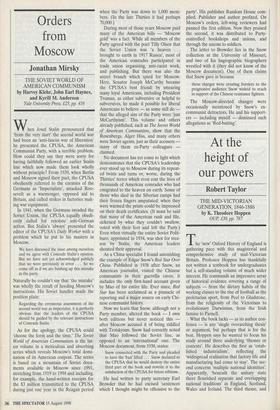Orders from Moscow
Jonathan Mirsky
THE SOVIET WORLD OF AMERICAN COMMUNISM by Harvey Klehr, John Earl Haynes, and Kyrill M. Anderson Yale University Press, £25, pp. 416 When Josef Stalin pronounced that `from the very start' the second world war had been an 'anti-fascist war of liberation' he presented the CPUSA, the American Communist Party, with a terrible problem. How could they say they were sorry for having faithfully followed an earlier Stalin line which now made them look wholly without principle? From 1939, when Berlin and Moscow signed their pact, the CPUSA obediently referred to the enemies of the Germans as 'Imperialists', attacked Roo- sevelt as a warmonger, opposed aid to Britain, and called strikes in factories mak- ing war equipment.
In 1941, when the Germans invaded the Soviet Union, the CPUSA equally obedi- ently called for resolute anti-German action. But Stalin's 'always' presented the editor of the CPUSA's Daily Worker with a problem which he put to his masters in Moscow.
We have discussed the issue among ourselves and we agree with Comrade Stalin's opinion. But we have not yet acknowledged publicly that we were previously in error . . . So we come off as if we are hushing up this mistake in the party.
Naturally he couldn't say that 'the mistake' was wholly the result of heeding Moscow's instructions. His Soviet handler made the position plain:
Regarding the erroneous assessment of the second world war as imperialist, it is perfectly obvious that the leaders of the CPUSA should be guided by the relevant instructions of Comrade Stalin.
As for the apology, the CPUSA could `choose the form and the time.' The Soviet World of American Communism is the lat- est volume in a meticulous and absorbing series which reveals Moscow's total domi- nation of its American outpost. The series is based on a mountain of Soviet docu- ments available in Moscow since 1991, stretching from 1919 to 1994 and including, for example, the hand-written receipts for the $3 million transmitted to the CPUSA during just one year in the Reagan period when the Party was down to 1,000 mem- bers. (In the late Thirties it had perhaps 70,000.) During most of those years Moscow paid many of the American bills — 'Moscow gold' was a fact. While all members of the Party agreed with the poet Tilly Olsen that the Soviet Union was 'a heaven . . . brought to earth in 1917 Russia', most of the American comrades participated in trade union organising, anti-racist work, and publishing. But there was also the secret branch which spied for Moscow. Here, Senator Joseph McCarthy became the CPUSA's best friend: by smearing many loyal Americans, including President Truman, as either subversive or helpful to subversives, he made it possible for liberal Americans to believe — as some still do that the alleged sins of the Party were 'just McCarthyism'. This volume and others already published, such as The Secret World of American Communism, show that the Rosenbergs, Alger Hiss, and many others were Soviet agents, just as their accusers many of them ex-Party colleagues claimed.
No document has yet come to light which demonstrates that the CPUSA's leadership ever stood up to Moscow during its repeat- ed twists and turns or, worse, during the Thirties' terror which even cost the lives of thousands of American comrades who had emigrated to the heaven on earth. Some of those who died in the Siberian camps had their frozen fingers amputated; when they were warmed the prints could be impressed on their death certificates. (It must be said that many of the American rank and file, sickened by what they couldn't swallow, voted with their feet and left the Party.) Even when virtually the entire Soviet Polit- buro, appointed in 1934, was shot for trea- son by Stalin, the American leaders shouted their approval.
As a China specialist I found astonishing the example of Edgar Snow's Red Star Over China. Published in 1938 after Snow, an American journalist, visited the Chinese communists in their guerrilla caves, it includes the only first-hand account given by Mao of his entire life. Ever since, Red Star has been acclaimed as a pinnacle of reporting and a major source on early Chi- nese communist history.
Now we learn that Snow, although not a Party member, altered the book — I own both editions but never noticed this after Moscow accused it of being riddled with Trotskyism. Snow had correctly noted that Mao followed the Soviet line, as opposed to an 'international' one. The Moscow document, from 1938, states:
Snow connected with the Party and pleaded to have the 'ban' lifted . . . Snow declared to the CPUSA that he would destroy the entire third part of the book and rewrite it to the satisfaction of the CPUSA for future editions.
He had written to party secretary Earl Browder that he had excised 'sentences which I thought might be offensive to the party'. His publisher Random House com- plied. Publisher and author profited. On Moscow's orders, left-wing reviewers had panned the first edition. Now they praised the second, it was distributed to Party- controlled bookshops and unions, and through the unions to soldiers.
The letter to Browder lies in the Snow collection at the University of Missouri, and two of his hagiographic biographers wrestled with it (they did not know of the Moscow document). One of them claims that Snow gave in because
these charges were creating barriers to the progressive audience Snow wished to reach in support of the Chinese resistance fighters.
The Moscow-directed changes were occasionally mentioned by Snow's ex- communist detractors. He and his support- ers — including myself — dismissed such allegations as 'Red-baiting'.


























































 Previous page
Previous page